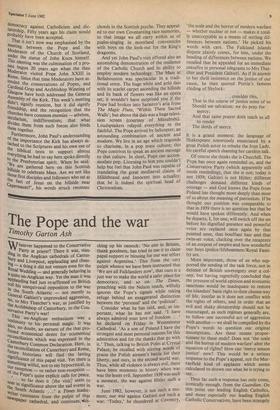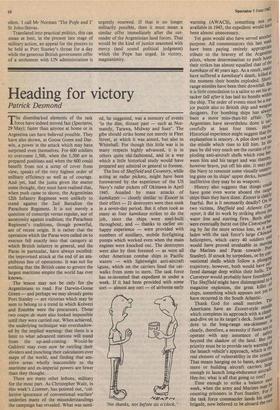The Pope and the war
Timothy Garton Ash
Whatever happened to the Conservative th Party at prayer? There it was, stan- ding in the Anglican cathedrals of Canter- '? urY and Liverpool, applauding and cheer- ing — a thing it did not venture even for the e Royal Wedding — and generally behaving a quite un-Anglican way. Yet the man it was applauding had just re-affirmed on British s. oil his unequivocal opposition to the war 1,,I1 the South Atlantic — not merely to General Galtieri's unprovoked aggression, no to Mrs Thatcher's war, as justified by the Archbishop of Canterbury, to the Con- servative Party's war! t This un-Anglican enthusiasm was a estim --onY to his personal magic. It was 40, no doubt, an earnest of the that pro- found ecumenical desire for ecumenical reconciliation which was expressed in the Canterbury Common Declaration. Here, in the reconciliation of Canterbury and Rome, future historians will find the lasting significance of this papal visit. Yet there is something wilful, not to say hypocritical, in °I. • or reception et,the — or rather non-reception — Pope's quite explicit calls for peace. s • . so far does it [the visit] seem to ,2ar in significance above the sad events in `tie South Atlantic ... ' a Times leader- writer ruminates from the pulpit of that newspaper cathedral, and continues, %hit- ching up his cassock: `No one in Britain, thank goodness, has tried to use it to claim papal support or blessing for our war effort against Argentina.' This from the very pulpit whence we have been instructed that 'We are all Falklanders now', that ours is a just war to make the world a safer place for democracy, and so on. The Times, preaching with the Nelson touch, wilfully ignores the Pope's signals while taking refuge behind an exaggerated distinction between the 'personal' and the 'political'. Consider what he has said, and, as im- portant, what he has not said. 'I have always admired your love of freedom ...' he declared on Friday in Westminster Cathedral. 'As a son of Poland I have the strongest and most personal reasons for this admiration and for the thanks that go with it.' Then, talking to British Poles at Crystal Palace, he recalled with stirring words of praise the Polish airmen's battle for their liberty, and ours, in the second world war. Thus, while all violence is always evil, there have been moments in history when war was the lesser evil. September 1939 was such a moment, the war against Hitler such a war.
June 1982, however, is not such a mo- ment, our war against Galtieri not such a war. 'Today,' he thundered at Coventry, `the scale and the horror of modern warfare — whether nuclear or not — makes it total- ly unacceptable as a means of settling dif- ferences between nations.' He picked his words with care. The Falkland Islands dispute plainly comes, for him, under the heading of differences between nations. We recalled that he appealed for an immediate ceasefire in personal telegrams to Mrs That- cher and President Galtieri. As if in answer to her shrill insistence on the justice of our cause, he then quoted Portia's famous chiding of Shylock: . consider this, That in the course of justice none of us Should see salvation: we do pray for mercy; And that same prayer doth teach us all to render The deeds of mercy.
It is a grand moment: the language of Shakespeare sonorously enunciated by a great Polish actor to rebuke the hop Lady, his careful speech shaming her careless talk.
Of course she thinks she is Churchill. The Pope has once again reminded us, and the Conservative Party (which apparently still needs reminding), that she is not; today is not 1939; Galtieri is not Hitler; different challenges demand different kinds of courage — and God knows the Pope from Poland has thought more deeply than most of us about the meaning of patriotism. If he thought our position was comparable to that in 1939 there is no question but that he would have spoken differently. And when he departs, I, for one, will switch off the set before his dignified presence and powerful voice are replaced once again by that pointed nose, that bouffant hair and that twin-set voice, clucking over the recapture of an outpost of empire and how wonderful our boys (police/lifeboatmen/Royal Fami- ly) are.
More important, those of us who sup- ported the sending of the task force, not in defence of British sovereignty over a col- ony, but having regretfully concluded that the pressure of world opinion and economic sanctions would be inadequate to restore the islanders' basic right to their chosen way of life, insofar as it does not conflict with the rights of others, and in order that an evil and shaky dictatorship should not be encouraged, as such regimes generally are, to follow one successful act of aggression with another — we shall be compelled by the Pope's words to question our original assumptions. Are these means propor- tionate to these ends? Does not 'the scale and the horror of modern warfare' alter the equation of rights? How can 'mercy season justice' now? This would be a serious response to the Pope's appeal, not the Mur- rayfield kind of applause which seems calculated to drown out what he is trying to say.
Thus far such a response has only come, ironically enough, from the Guardian. On this point our leading English Catholics, and more especially our leading English Catholic Conservatives, have been strangely
silent. I call Mr Norman 'The Poke and I' St John-Stevas.
Translated into practical politics, this can mean at best, in the present late stage of military action, an appeal for the pincers to be held at Port Stanley's throat for a day while the generous British government offer of a settlement with UN administration is urgently renewed. If that is no longer militarily possible, then it must mean a similar offer immediately after the sur- render of the Argentinian land forces. That would be the kind of justice seasoned with mercy (and sound political judgment) which the Pope has urged. In victory, magnanimity.







































 Previous page
Previous page